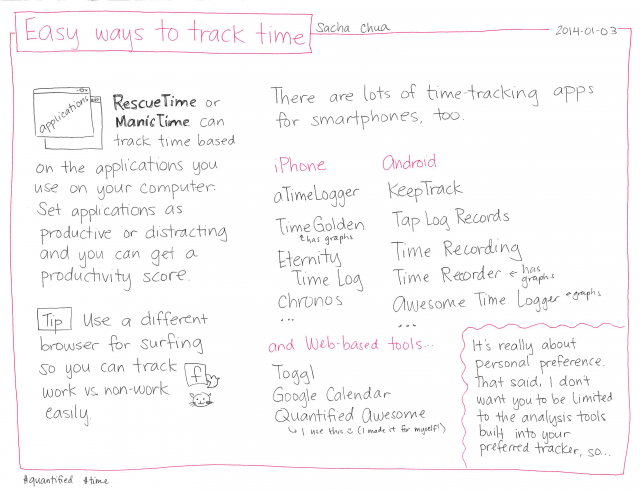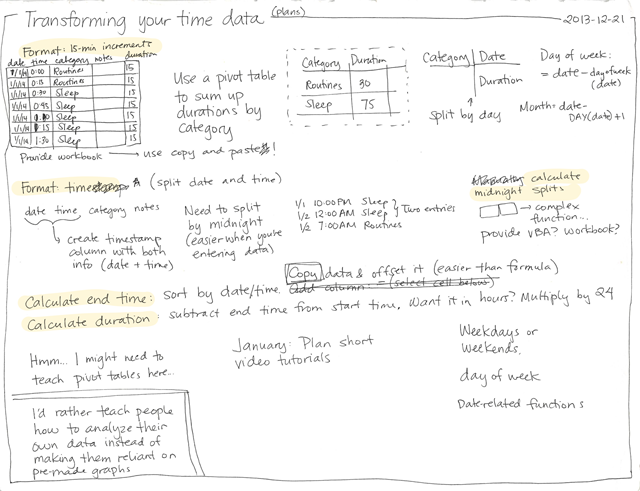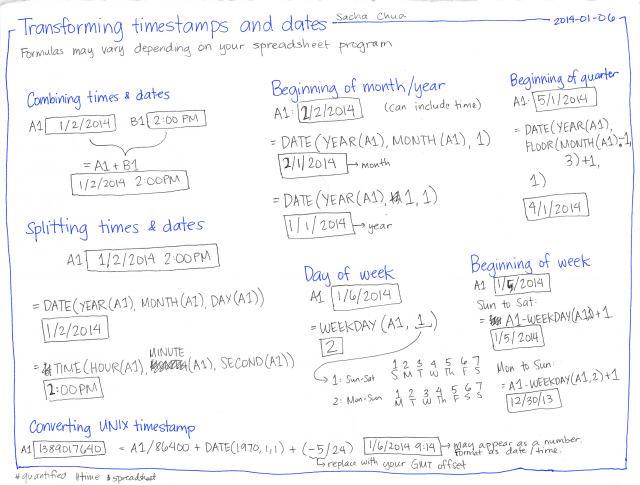Book idea: Quantified Self: Tracking Your Time
Posted: - Modified:For: Semi-technical people who are interested in tracking their time and asking questions about how they invest their time
Outcome: People are comfortable collecting and analyzing their time data with a variety of tools, and may even build themselves personal dashboards so that they can monitor their time use on an ongoing basis
The Whys and Hows of Tracking Time
Discuss objectives and motivations for tracking time. Plan possible questions you want to ask of the data (which influences which tools to try and how to collect data). Recommend a set of tools based on people’s interests and context (paper? iPhone? Android? Google Calendar?).
Resources: Presentations on time-tracking, recommendations for tools, more detail on structuring data (categories, fields); possible e-mail campaign for reminders
Output: Planning worksheet for participants to help people remember their motivations and structure their data collection; habit triggers for focused, small-scale data collection, buddying up for people who prefer social accountability
Staying on the Wagon + Preliminary Analysis
Dealing with challenges. Preliminary analysis of small-scale data.
Resources: Frequently-encountered challenges and how to deal with them; resources on habit design; tool alternatives
Output: Things to try in order to support habit change; larger-scale data collection for people who are doing well
Analyzing your data
Massaging your data to fit a common format; simple analyses and interpretation
Resources: Common analysis format and some sample charts/instructions; maybe even a web service?
Output: Yay, charts!
More ways you can slice and dice your data
Bring other questions you’d like to ask, and we’ll show you how to extract that out of your data (if possible – and if not, what else you’ll probably need to collect going forward). Also, understanding and using basic statistics
Resources: Basic statistics, uncommon charts
Output: More analyses!
Making data part of the way you live
Building a personal dashboard, integrating your time data into your decisions
Outcome: Be able to make day-to-day decisions using your time data; become comfortable doing ad-hoc queries to find out more
Designing your own experiments
Designing experiments and measuring interventions (A/B/A, how to do a blind study on yourself)
Outcome: A plan for changing one thing and measuring the impact on time
Recap, Examples
Participants probably have half a year of data and a personal experiment or two – hooray! Share thoughts and stories, inspire each other, and figure out what the next steps look like.




3 comments
Harvey Chua
2014-06-23T03:13:40ZDear Sacha - What is the absolutely simplest way to track activities?
Love,
Mom
sachac
2014-06-23T21:51:12ZHi Mom! Try pen/pencil and paper, and try tracking just one activity for starters. For example, you might be curious about how much time you can actually set aside for writing, or how much time you spend in traffic, or how much time you spend working, or other things like that. Pick one activity to focus on, then write down the date, start time, and end time when you do it. If you miss something, don't worry - just write down good estimates. When you've paid attention to your time for a week or two, sometimes just reading the logs is enough to get you to start noticing patterns. Hope that helps!
Harvey Chua
2014-06-24T00:17:07ZThanks. I probably don't need to go back to pen and pencil. A spreadsheet on my computer or phone will do. :)